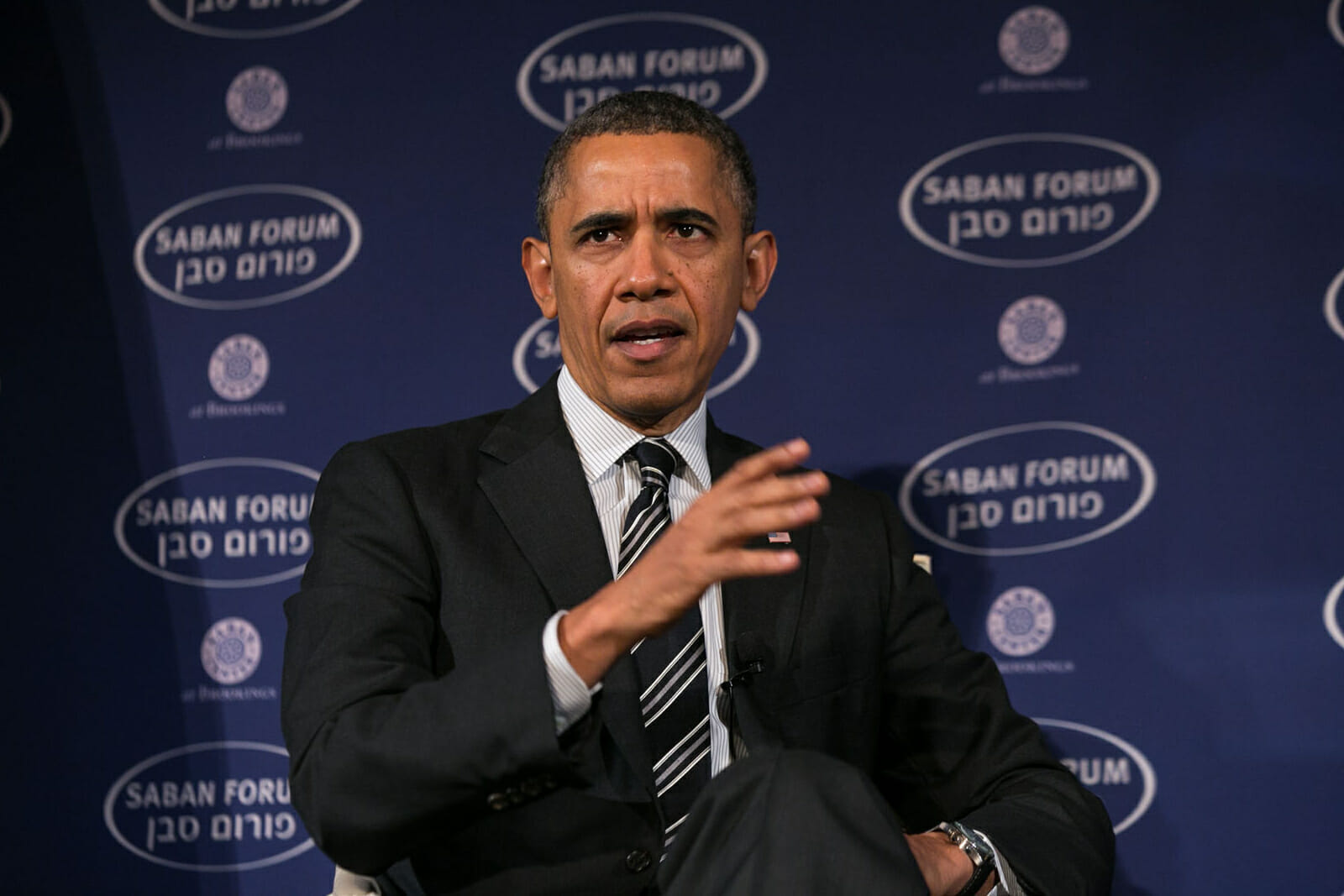
Obama Defends the Iran Deal
President Barack Obama speaking on Saturday at the Saban Center for Middle East Policy at the Brookings Institution to an influential audience of Israeli supporters and journalists offered his best defense, so far, of the Iranian nuclear agreement reached in Geneva between Iran and the P5+1. As part of the six-month agreement, the United States would allow Iran some enrichment capabilities. While critics of the agreement and any agreement for that matter argue that Iran should not have any enrichment capabilities, the president accurately pointed out that that’s not feasible given the technology behind enrichment. “Theoretically, they (Iran) will always have some, because, as I said, the technology here is available to any good physics student at pretty much any university around the world.”
While Obama gave the agreement a fifty percent chance of success he nonetheless insisted that the diplomatic effort is worth it. If a long-term agreement isn’t reached, the international community is “no worse off” than when it started. “If at the end of six months it turns out that we can’t make a deal, we’re no worse off, and in fact, we have greater leverage with the international community to continue to apply sanctions and even strengthen them,” Obama said.
The forum at Brookings, hosted by Haim Saban, an Israeli-American billionaire, covered many similar themes when asked about Israeli security and what the agreement will mean in the long term.
“We have to be vigilant about maintaining our security postures, not be naive about the dangers that an Iranian regime poses, fight them wherever they’re engaging in terrorism or actions that are hostile to us or our allies,” Obama said.
But in addressing skeptics of the agreement like Israeli Prime Minister Benjamin Netanyahu who has warned repeatedly that the Iranians cannot be trusted, Obama told the audience, “we have to not constantly assume that it’s not possible for Iran, like any country, to change over time. It may not be likely. If you asked me what is the likelihood that we’re able to arrive at the end state that I was just describing earlier, I wouldn’t say that it’s more than fifty-fifty. But we have to try.”
The agreement reached in Geneva now has a better chance at success than at any time previously precisely because of the political changes that were brought about by recent Iranian elections. While Iran’s supreme leader, Ayatollah Ali Khamenei, ultimately holds all the cards about whether to sign off on any agreement, the 2009 Green Revolution points to a problem for the ruling establishment. Iran is a much more transparent society than Iran’s critics argue. Iranians have been severely impacted by economic sanctions and perhaps sensing the possibility that more unrest is in the future unless an agreement is reached and sanctions are eased, Khamenei would be willing to cede to the demands of the international community for Iran to halt its alleged nuclear weapons program.
Simply put, as Obama stressed on Saturday, Hassan Rouhani isn’t Mahmoud Ahmadinejad, the firebrand former president who was fond about waxing over Israel’s destruction and who at one point stressed that there are no gay Iranians.
“The fact of Rouhani’s election – it’s been said that there’s no difference between him and Ahmadinejad except that he’s more charming. I think that understates the shift in politics that took place in this election. Obviously, Rouhani is part of the Iranian establishment and I think we have to assume that his ideology is one that is hostile to the United States and to Israel. But what he also represents is the desire on the part of the Iranian people for a change of direction. And we should not underestimate or entirely dismiss a shift in how the Iranian people want to interact with the world,” Obama told an Israeli journalist.
The agreement, while tenuous, could easily be undone should Iran balk at any of the details to be presented at the upcoming meeting with the P5+1. For decades, U.S-Iran relations have been marked by mutual distrust and animus, and should the agreement fail it will just be another footnote in history and another failure for Obama’s foreign policy.
Some observers assess that a long-term solution to the Iranian nuclear enrichment pursuit could be historically significant, especially when analyzed in the historical context of important moments towards the end of the Cold War. Analysts subscribing to this assessment posit that a solution to the issue of Iranian nuclear pursuit could be historically analogous to negotiations between U.S. and Soviet leaders that elicited agreements such as the Strategic Arms Limitation Treaties (SALT) negotiated at Helsinki and Vienna. The SALT treaties contributed to a thawing of relations under the détente policies of President Richard Nixon. Later, the Reykjavik summit attended by U.S. President Ronald Reagan and Soviet General Secretary Mikhail Gorbachev on October 11-12, 1986, although concluding without an agreement, led to breakthroughs in talks between the U.S. and the Soviet Union.
The analogy to Reykjavik is especially intriguing given that the summit concluded without an official agreement but is now widely accepted as having been instrumental in the establishment of the Intermediate-Range Nuclear Forces Treaty, signed by both the U.S. and the Soviet Union a little over a year later on December 8, 1987. In this context, the recent efforts by Obama and Rouhani, while not comprehensive and lacking in the sort of global consensus that could cement agreements as a solid framework for future negotiations, could be the breakthrough that the Reykjavik Summit proved to be for the U.S. and Soviet Union.

